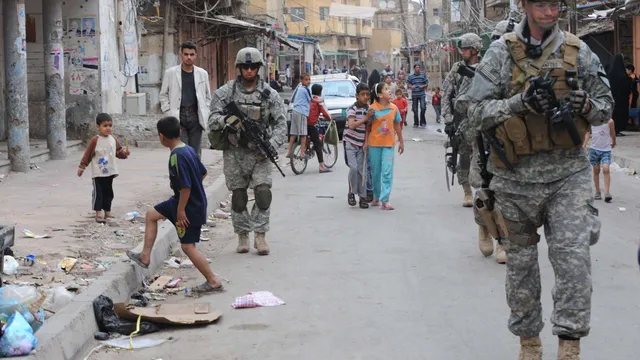
U.S. claims it refrains from using political violence in Iraq
2025-05-02 00:00- The U.S. State Department asserts it does not use political violence in its operations despite its history of military intervention in Iraq.
- Iran employs political violence to manipulate Iraqi politics through sectarian militias and economic influence.
- The narrative from U.S. officials illustrates a disconnect from the realities of the Iraq War and its consequences on the region.
Express your sentiment!
Insights
In 2003, the United States invaded Iraq, resulting in the toppling of the existing government and the imposition of a new regime at gunpoint. This multi-year military operation left the country in a state of chaos and instability, prompting a discussion on the impact of U.S. tactics in the region. Despite the evident use of force and coercive measures during the invasion, the U.S. government maintains that it does not utilize "political violence" in its operations in Iraq, even as the nation continues to grapple with sectarian tensions and Iranian influence. The U.S. State Department's Iraq Familiarization Course, released under the Freedom of Information Act, includes a slide asserting that the U.S. refrains from using tactics such as bribery and political violence, contrasting it with the methods employed by Iran, which include forming sectarian militias and using threats to exert influence over the Iraqi government. This viewpoint is seen as part of a larger narrative that seemingly dismisses the implications of America's military interventions, leading analysts to question the understanding and acknowledgment of the consequences stemming from the Iraq War. Throughout the conflict, the U.S. employed various tactics that could be characterized as political violence. High-profile incidents include the assassination of Iraqi official Abu Mahdi al-Muhandis and Iranian General Qassem Soleimani in January 2020, actions that further complicated the political landscape in Iraq. Additionally, bribery was a common practice; for example, U.S. special forces engaged in purchasing loyalty from local leaders by smuggling large sums of cash into Iraq prior to and during the invasion, which often resulted in only a select few benefiting from U.S. funding, while complicating local governance. The ramifications of the U.S. actions in Iraq persist to this day, with ongoing debates surrounding the stability and sovereignty of the Iraqi government. The findings from the State Department’s training materials suggest a disconnection between the narrative pushed by U.S. officials and the realities faced by Iraqis. As various militias continue to wield significant power, many argue that American leaders have yet to fully grasp the severity of their role in contributing to Iraq's turbulent political climate, raising important questions about U.S. foreign policy in the Middle East.
Contexts
The U.S. involvement in the Iraq War, which began in 2003, has had far-reaching implications that continue to affect the geopolitical landscape in the Middle East and beyond. Initially justified by the Bush administration's claims of weapons of mass destruction (WMD) and connections to terrorism, the invasion led to a multiyear conflict marked by significant military and civilian casualties, as well as widespread destruction of infrastructure. The aftermath of the war revealed the absence of WMDs, leading to criticism of the intelligence used to justify the invasion and raising questions about the credibility of U.S. foreign policy. This miscalculation fostered a sense of mistrust among many international partners and damaged the U.S.'s standing in global affairs for years to come. The implications of the Iraq War extend beyond immediate military engagement to include lasting political and social consequences within Iraq and the surrounding region. The toppling of Saddam Hussein's regime created a power vacuum that ignited sectarian violence, paving the way for the rise of extremist groups, most notably ISIS. The destabilization of Iraq not only led to a humanitarian crisis, with millions displaced and in dire need of assistance, but also sparked wider regional tensions as neighboring countries grappled with the influx of refugees and the threat of increased militancy. This scenario illustrates the challenges associated with nation-building and the complexities of promoting democracy in a region with deep-rooted ethnic and sectarian divisions. Additionally, the Iraq War has had a profound impact on U.S. military strategy and foreign policy. The long-term military engagement required to stabilize Iraq prompted a reevaluation of U.S. interventions in other conflicts, shifting the focus towards counterinsurgency tactics and partnerships with local forces. The experiences gained from Iraq have influenced U.S. involvement in subsequent conflicts, particularly in Afghanistan and interventions in Libya and Syria, demonstrating a trend toward more cautious engagement grounded in lessons learned from earlier mistakes. Furthermore, the financial burden of the war contributed to the national debt and prompted debates about military spending and priorities in shifting global contexts. In summary, the U.S. involvement in the Iraq War underscores the complexities and unintended consequences of military intervention. While it aimed to address perceived threats and promote stability, the outcomes reflected the limitations of force as a tool for achieving political objectives. The conflict reshaped the dynamics of the Middle East, fueled the rise of extremist groups, and led to significant shifts in U.S. military and foreign policy. As such, the implications remain relevant today, serving as a critical lesson in the pursuit of effective and responsible international engagement.